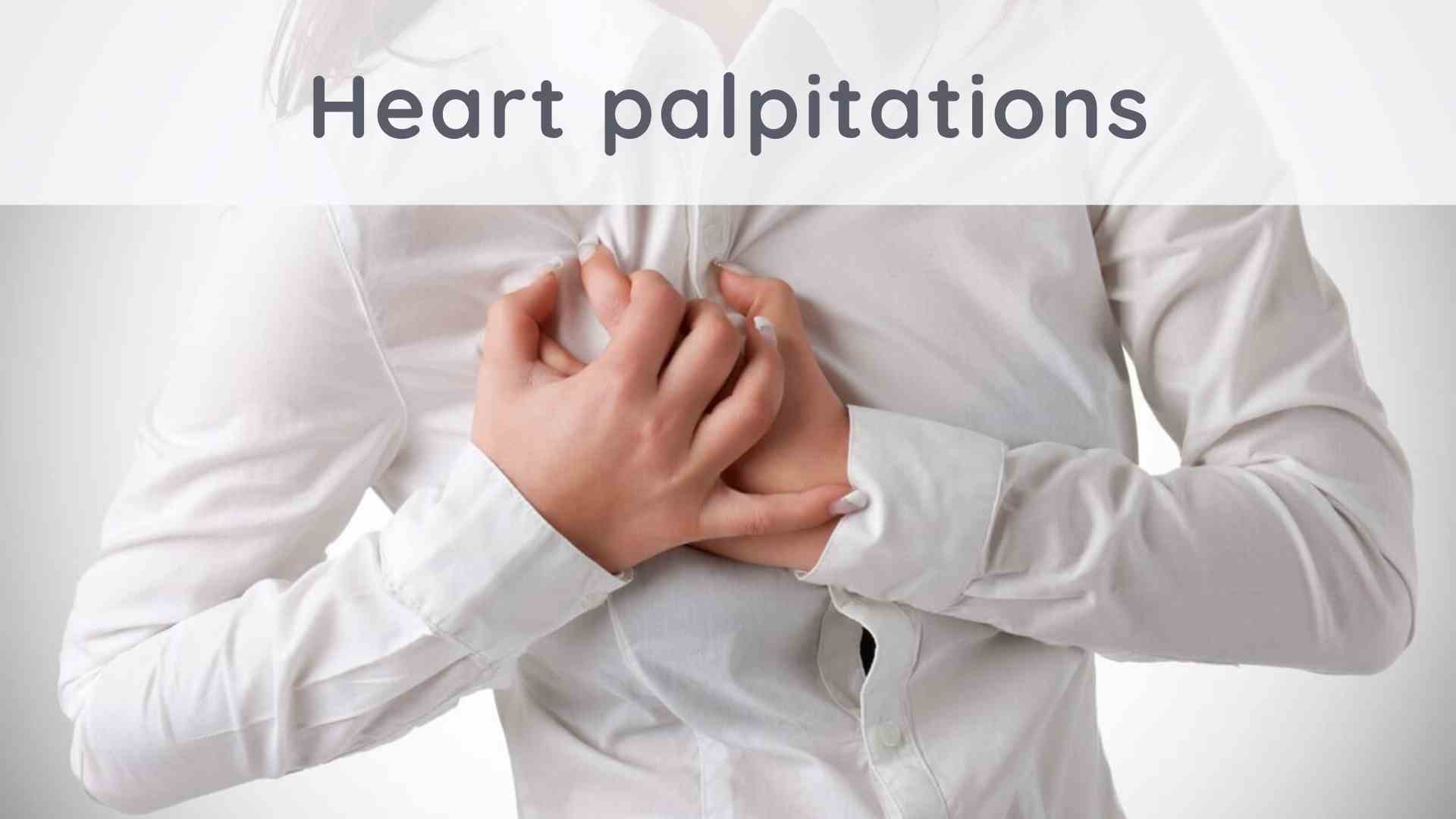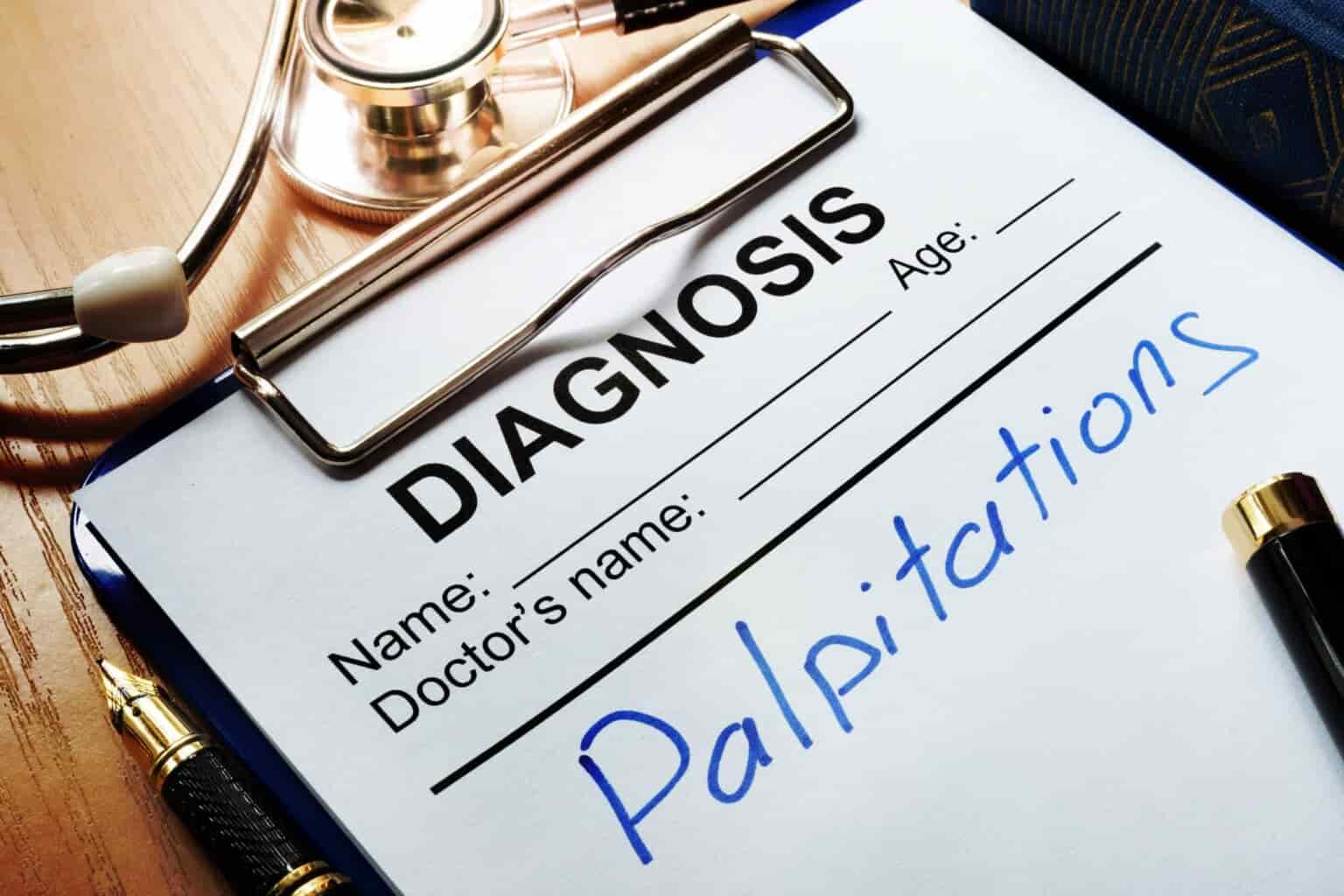HEART PALPITATIONS
Heart palpitations are sensations of having a fast-beating, fluttering or pounding heart. Stress, exercise, medication, or, rarely, a medical condition could trigger them.
However, heart palpitations could be worrisome, they are generally harmless. In rare cases, they could be a symptom of a more severe heart condition, like an irregular heartbeat (arrhythmia) that may need treatment.

HEART PALPITATIONS SYMPTOMS
Heart palpitations could feel like your heart is:
- Skipping beats
- Fluttering quickly
- Beating too fast
- Pounding
- Flip-flopping
You may experience heart palpitations in your throat or neck as well as your chest. They could happen when you are active or at rest.
WHEN SHOULD YOU SEE A DOCTOR?
Palpitations that are rare and last only a few seconds generally do not need to be evaluated. If you have a history of heart disease and have palpitations that happen frequently or worsen, talk to your doctor. He or she may recommend heart-monitoring tests to see if your palpitations are caused by a more severe heart problem.
Look for emergency medical attention if heart palpitations are accompanied by:
- Chest discomfort or pain
- Fainting
- Severe shortness of breath
- Severe dizziness

HEART PALPITATIONS CAUSES
Generally, the cause of your heart palpitations cannot be found. Common causes include:
- Strong emotional responses, like stress, anxiety, or panic attacks
- Depression
- Strenuous exercise
- Stimulants, including caffeine, nicotine, cocaine, amphetamines, and cold and cough medicines that consist of pseudoephedrine
- Fever
- Hormonal changes linked to menstruation, pregnancy, or menopause
- Too much or too little thyroid hormone
Sometimes heart palpitations could be a sign of a severe complication, like an overactive thyroid gland (hyperthyroidism), or an abnormal heart rhythm (arrhythmia).
Heart rhythm changes (arrhythmias) may cause a very fast heart rate (tachycardia), an uncommonly slow heart rate (bradycardia), a normal heart rate that varies from the usual heart rhythm or combination of the three.
HEART PALPITATIONS RISK FACTORS
You may be at risk of developing heart palpitations if you:
- Are highly stressed
- Experience an anxiety disorder or have regular panic attacks
- Are pregnant
- Take medicines that contain stimulants, such as some cold or asthma medicines
- Have an overactive thyroid gland (hyperthyroidism)
- Have other heart problems, such as an arrhythmia, a heart defect, previous heart attack, or previous heart surgery
HEART PALPITATIONS COMPLICATIONS
Unless a heart condition is causing your heart palpitations, there is little risk of complications. For palpitations caused by a heart condition, potential complications include:
- Fainting – If your heart beats quickly, your blood pressure could drop, causing you to faint. This may be more likely if you have a heart issue, like congenital heart disease or specific valve problems.
- Cardiac arrest – Rarely, palpitations could be caused by life-threatening arrhythmias and could cause your heart to stop beating effectively.
- Stroke – If palpitations are because of a state in which the upper chambers of the heart quiver instead of beating properly (atrial fibrillation), blood could pool and cause clots to form. If a clot breaks loose, it could block a brain artery, causing a stroke.
- Heart failure – This could result if your heart is pumping ineffectively for a prolonged period because of an arrhythmia, like atrial fibrillation. Sometimes, controlling the rate of an arrhythmia that is causing heart failure could improve your heart’s function.

HEART PALPITATIONS DIAGNOSIS
Your doctor will listen to your heart with the help of a stethoscope and ask questions about your medical background. He or she will also likely look for signs of medical conditions that could cause heart palpitations, like a swollen thyroid gland.
If your doctor speculates that your palpitations are caused by arrhythmia or other heart conditions, tests may involve:
- Electrocardiogram (ECG) – In this non-invasive test, a technician place leads on your chest that record the electrical signals that cause your heart to beat.
An ECG could help your doctor identify complications in your heartbeat and heart structure that can cause palpitations. The test will be done either while you rest or at the time of exercise (stress electrocardiogram). - Holter monitoring – You wear this portable device to record a continuous ECG, generally for 24 to 72 hours, while you maintain a diary of when you feel palpitations. Holter monitoring is used to detect heart palpitations that are not found at the time of a regular ECG examination. Some personal devices, like smartwatches, offer ECG monitoring. Inquire your doctor if this is an option for you.
- Event recording – If you do not have irregular heart rhythms while you wear a Holter monitor or if the events happen less than once weekly, your doctor may recommend an event recorder. This portable ECG device is meant to track your heart activity over a week to a few months. You wear it all day, but it records only at specific times for a few minutes at a time. You activate it by pressing a button when you have symptoms of a fast heart rate.
- Echocardiogram –This non-invasive examination creates a moving picture of your heart using sound waves. It could show blood flow and structural problems with your heart.

HEART PALPITATIONS TREATMENT
Unless your doctor discovers that you have a heart condition, heart palpitations rarely need treatment. Instead, your doctor may suggest ways for you to avoid the triggers that cause your palpitations.
If your palpitations are caused by a condition, like an arrhythmia, the treatment will concentrate on correcting the condition.
If you or anyone you know is suffering from heart palpitations, our expert providers at Specialty Care Clinics will take care of your health and help you recover. (469) 545-9983 to book an appointment with our expert doctors.
